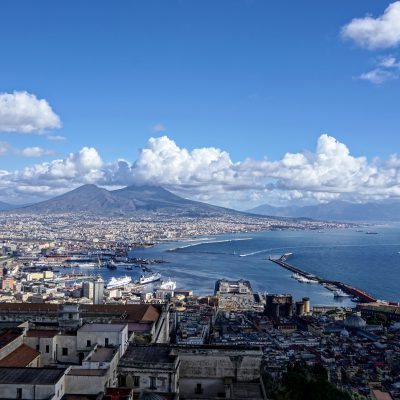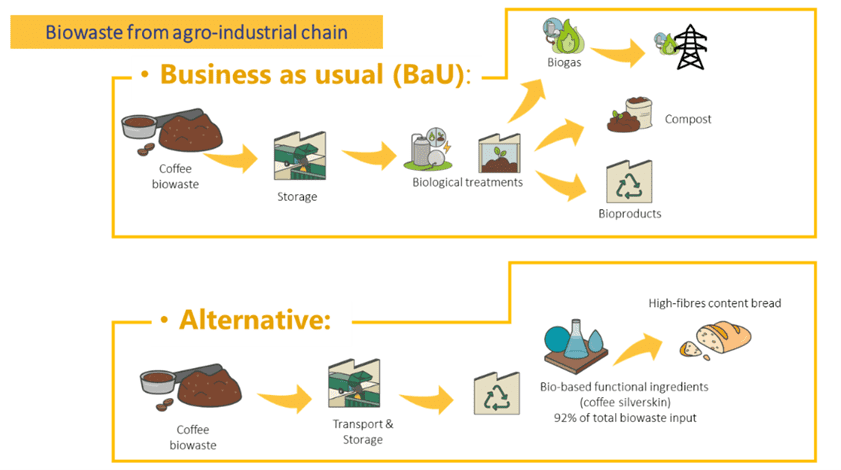
Da Ottobre 2021 a Settembre 2023, il progetto Biocircularcities approfondirà le potenzialità dell’economia circolare al fine di analizzare e sviluppare modelli per la gestione dei rifiuti organici che siano efficienti sia dal punto di vista economico che ambientale in tre aree pilota. La Città Metropolitana di Napoli è una di queste!

Population: 3.2 million
Area: 1,171 km2
Density: 5,093 inhabitant/km2
Separate collection rate: 48.38% (2020)
Value chain targeted: biowaste from coffee chain
Popolazione: 3.2 milioni
Superificie: 1,171 km2
Densità: 5,093 abitanti/km2
Raccolta differenziata: 48.38% (2020)
Catena di valore selezionata: rifiuti organici della filiera del caffè
The situation: The Metropolitan City of Naples is an area where biowaste processing capacity is currently insufficient to treat the total amount generated. Municipal solid waste collection in the MCN is based on a combination of two different schemes: “door-to-door” and “dumpster collection”. In 2020 around 50% of urban waste was sorted separately. The main technology used to process the unsorted municipal solid waste is Mechanical Biological Treatment (MBT). Dry fractions obtained from local MBT plants are sent to the incineration facility located in the metropolitan area and outside. Local waste-processing capacity for the organic fraction is limited to only one composting plant and two integrated anaerobic and aerobic treatment plants.
The goal: Improving the current waste management system of a region encompassing urban, agricultural and industrial areas with important biomass production activities and an important food supply chain.
Current biowaste management system: Collection of the biowaste (coffee silver skins) from a coffee agro-industrial company in MCN and transport to a treatment facility (current biological treatments).
Biocircularcities Alternative Scenario: Collection of coffee silver skins from the investigated agro-industrial company to the new conversion to produce added value products (e.g. bio-chemicals, nutraceutical bioproducts etc.)
Stato dell’arte: Nella Città Metropolitana di Napoli la capacità di trattamento dei rifiuti organici è attualmente insufficiente per trattare il totale dei rifiuti generati. La raccolta dei rifiuti urbani nell’area metropolitana è basata sulla combinazione di due schemi differenti: “porta a porta” e “cassonetti stradali”. Nel 2020 la raccolta differenziata ha interessato circa il 50% dei rifiuti urbani. La tecnologia principalmente adottata per il trattamento dei rifiuti urbani indifferenziati è il Trattamento Meccanico Biologico (TMB). La frazione secca ottenuta dai trattamenti meccanici biologici locali è inviata ad impianti di termovalorizzazione, situati sia al di fuori che nell’area metropolitana. La capacità locale di trattamento dei rifiuti organici da raccolta differenziata è limitata ad un solo un impianto di compostaggio e a due impianti integrati di digestione anaerobica ed aerobica.
Obiettivo: Migliorare l’attuale sistema di gestione dei rifiuti di un’area che include realtà urbane, agricole ed industriali, focalizzando l’attenzione sulla valorizzazione delle filiere agro-alimentari locali.
Attuale sistema di gestione dei rifiuti organici: Raccolta di rifiuti organici (silverkin del caffè) da un’azienda agroindustriale del caffè all’interno della Città Metropolitana di Napoli ed il trasporto ad un impianto di trattamento biologico.
Scenario Alternativo del progetto Bicircularcities: Raccolta della silverskin del caffè dall’azienda agroindustriale analizzata fino al recupero per produrre prodotti ad alto valore aggiunto (es. prodotti biochimici, bioprodotti nutraceutici ecc.).
Biocircularcities in brief #2
A short overview of our activities between June 2022 and November 2022.
Biocircularcities in brief #1
A short overview of our activities between October 2021 and May 2022.
Biocircularcities in a nutshell – Leaflet
Biocircularcities Брошура / Biocircularcities tríptic / Biocircularcities folleto / Biocircularcities opuscolo
NewsView more
11 February 2024
Biocircularcities features two articles in a scientific journalThe Biocircularcities and its three pilots continue to stir attention even after the official end of…
5 July 2023
Flour for bread from coffee waste: Naples presents its resultsParticipants of the local final event of the Biocircularcities project in Naples were surprised to learn…
26 May 2023
Should coffee silverskin in Naples be converted into flour?The 3rd Peer Review Session of the Biocircularcities project was held on 23-24 May 2023. It…
EventsMore events
15 June 2023 | Naples
Biocircularcities unlocked – The Naples stopThe results of the Biocircularities project were shared during a final event in Naples. During the…
24 March 2023 | Naples
Naples Local Living Lab #3“Preliminary results from sustainability assessment for the selected biowaste chain and presentation of the Biocircularcities webtool…
22 September 2022 | Online
Naples Local Living Lab #2“Barriers and drivers to circular bioeconomy implementation in the agro-industrial and municipal biowaste chain in the…
